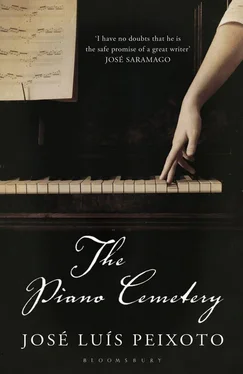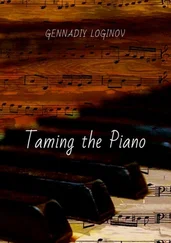
Me: in a photo, immobile, seeing the living reflection of myself, maybe wondering at what I have become, frozen and watching myself closely. I smiled at them as they’d expected, put the photograph down on the same low cupboard shelf, and there, in a time I shall never know, a time that has stopped in that photograph, I remained, still looking in some direction in that room, eternally looking in some direction in that room

Kilometre twenty-seven
oh Mother, don’t, don’t cry, purest queen of heaven, help me for ever
tear of blood from the sun, boiling in the corner of my eye, rolling down my cheek, clouding up my sight of what will always be unknown to me, death
not yet born
yet. The music she played as I lay there, naked body on the hall rug, broken-apart, aching body. The music tracing a path in eternity, a road supported by liquid trees, by reflections of trees in the breeze. The slow, lingering music, over everything that was beginning to exist — transparent worlds
cold. That night I arrived home later. My wife knew. I was sure of it. The oil lamp lit up the curves of her body — her belly. Our child was — is — there, not yet born, maybe mingled with earth, with sky, with sun. Maybe next to my father, maybe watching me through him. My father’s eyes being his, his eyes being my father’s eyes — the same darkness, the same incandescent light. That night, falling asleep, we met. Then, the morning. Close to the mornings of the previous days, and different. I opened the workshop door. In the cold, I was completely awake. It was a clear time of day. Time passed, with me on my own. I resumed old jobs, which had been left since the day the lady came in and showed me the burned piano, the day we went to fetch the upright piano from the home of the man from the taberna and started fixing it up. Later, in a moment within my thoughts, I thought I heard footsteps in the entrance hall. My attention. I wanted Simão to arrive. And silence. I said his name. My brother’s name dissolving into the silence. He didn’t come. He didn’t come in the afternoon. He didn’t come the next day, or the next, or the next, or the next.
my father calling me
in my body as it lost the shape of running; in my elbows no longer a right angle, now uncoordinated outlines, each of my arms, on its own, standing out from my body, trying to survive, trying to cling on to some invisible image that supported them; in my legs falling on to the road with each step, digging into the road under my own body’s unbalance
a weight that never goes away. I was still small, the boys of my age only thought about little games, they hoped it wouldn’t rain, and there was me, always, always carrying this black weight in my chest. For just a moment, Maria saying something funny, our mother happy, me happy, and right afterwards — or at that same moment — I’d remember the black weight — lead — which never left my chest. Perhaps in winter, night-time, the kitchen, Marta talking about something purely good. Our father in a contented silence. And me, almost well except for the weight that never left, that I was sure would never leave my chest. And it never left, that late afternoon never left, under the branches of the peach trees, my brother arriving home — Simão, Simão — and me blinding him for ever. After that day it happened only twice. I was nine years old, he was fifteen. In the bedroom we were fighting, he’d tired of pushing me, he threw me on to the bed and said, ‘You made me blind.’ And there was nothing I could reply with, I couldn’t get up and call him names. I was twelve years old, he was eighteen. In the piano cemetery we got angry for some reason and I accused him of not wanting to work, I said to him, ‘You’re a parasite.’ He stood there looking at me with his firm, iron eye and he said, ‘You made me blind.’ Those words went right through me, words he said to me only twice but every day since that afternoon, when I was still small, when my voice had changed, when our father began to be ill, when he died, when I met my wife, during and before and after each marathon, repairing a piano, at each piano note played by the tuner, when I learned I was going to have a child, falling asleep, waking, now, I never forget, and in remembering always, always I have a black weight
Kilometre twenty-eight
that never leaves my chest. The guilt. I’ve thought so often about what it would have been like if I had been the one blinded in one eye and not Simão, I’ve thought so often about how much I’d have wanted me to be the one blinded. Later on, I think about how ridiculous I am, that I don’t really feel that, that I’m an egotist, and, more ridiculous still, I feel sorry for myself for not even being able to feel sorry for myself. Many times I believed I’d got used to this weight, I believed it had become a part of me, like my arms, my legs, but every time I saw my brother turning his whole head to see something that was happening to his right, each time I remembered how he moves his head, I realised that I’d never
a child
on the day he died
in the yard, with my mother’s weeding-hoe. I had a tin full of worms by the end of the afternoon. When I showed them to my father, he said: ‘Tomorrow you wake up early and you’ll come with me.’ We went to the workshop just to fetch a bucket, my father’s fishing-rod and a small rod he’d made for me from a very thin lath. My eyes shone when they saw it — it had a coconut-fibre thread tied to one end of it, and at the end of the line two or three round lead weights and a hook. My father put it in my hands and said, ‘It’s yours.’ He waited, in his contentment, and with a father’s voice said, ‘Be careful with the hook.’ We went out together and it was still early. I carried my rod in one hand, the tin of worms in the other, and I was proud. My father carried his rod in one hand and the empty bucket in the other. There were not many people out on the street yet, but as we walked I’d have liked them to have looked at us. A father, a son. We reached the park and went round behind walls of boxwood, under flowering trees, through the green smell of trimmed bushes, through the sweet smell of flowers. When we reached the lake, our reflection in the water was my father, big, my father, and me, small, beside him, boastful, happy. Then I looked through the water, fresh and green-tinged and thick with slime over a bed of dust that was liquid, almost liquid, light, and I saw the fishes slipping, bending their red, yellow, orange bodies. I saw the fishes slipping, serious, serene. My father pointed to one of them and whispered, ‘It’s a pompano fish, see?’ I replied in my child’s voice, in my eagerness, but he put his index finger to his nose and said, ‘Shhh.’ He whispered, ‘Don’t startle the fish.’ We were up against a barrier that came up to our knees, between a bush and the little house for the two ducks that slept and floated adrift in the lake. I chose a worm from the tin — it twisted itself between my fingers — and I felt sorry for it. It was my father who chose another and taught me to put it on the hook. Then it was him who taught me to dip the hook in the water and to give it a light tap, a light tap. When a fish came close, my father put his hands over mine and taught me to pull it in. When my father took the hook from its mouth and put it in the bottom of the bucket I watched it until my father caught another and another. He caught two more. In a short time we’d filled up the bucket. It was still early and we were already heading home. It seemed natural to me that it was still early, just as it seemed natural to me that we were returning by the same way we’d come, behind walls of boxwood, under flowering trees. My father had the bucket hanging from one arm. I watched him admiringly. He made his way contentedly, father, my father. He had his work clothes on, his sleeves rolled up, his strong arms. I had a hat wedged on to my head, but it was only then as we returned that the sun
Читать дальше














